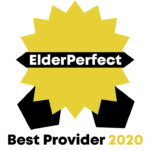What Is It?
People like to stay active and need to stay active whether it’s physical exercise, daily tasks or leisure activities. Sometimes an illness or condition prevents us from completing these activities or participating in enjoyable leisure activities. This may be the result of a physical disability due to stroke, injury, muscle weakness or posture; pain due to arthritis, injury or diabetic neuropathy; breathing difficulty due to chronic obstructive pulmonary disease (COPD), congestive heart failure (CHF), pneumonia, emphysema or bronchitis; or stamina due to a heart attack or other cardiac condition.
The activities that we complete each day — bathing, dressing, grooming, feeding and toileting — are called activities of daily living (ADLs). The more complex daily activities that we do such as cooking, home management, safety management and traveling within the community, are called instrumental ADLs (IADLs). Occupational Therapists (OTs) are the professionals who typically work to improve ADLs and IADLs, but Physical Therapists (PTs) and Speech-Language Pathologists (SLPs) also have a role to play. The ability to engage in meaningful, purposeful activity is important for a person’s quality of life, and sometimes the problems mentioned above prevent a person from being able to participate in or enjoy recreational or leisure activities that had previously been pleasurable.
How We Treat It
In partnership with Aegis Therapies, we work with the individual who has this difficulty, along with family members, to:
- Identify the person’s cognitive (thinking ability) level so that appropriate activities can be determined
- Determine the person’s interests and previous activities
- Promote proper posture and recommend seating or positioning devices as needed
- Train ways to simplify and pace an activity in order to conserve energy and think through it easier
- Educate how to use adaptive equipment that can help complete an activity, for example, a long-handled reacher to get items that are far away or a weighted utensil to assist in feeding
- Train strategies to complete ADLs, IADLs and leisure activities in a safe and effective way that compensates for the person’s disability
- Recommend a successful living arrangement along with the required level of assistance and supervision
What You Can Expect
Involvement in activity is a vital part of our daily lives, and we seek to restore that capacity whenever possible. Sometimes, however, the lost function is not able to return, so our therapists focus on teaching the person compensatory strategies to be able to still perform the activity. In other cases, when function cannot return and the person cannot learn compensatory strategies, therapists will work with the family and caregivers to modify the activity and teach the best way to adapt the approach to providing assistance. Either way, the goal is to improve function to the highest level possible and keep the person engaged in activity for as long as possible.
Additional Resources
Breathing Patterns for Activities of Daily Living (ADLs) to follow:
- When standing up from sitting, breathe out (exhale) when sitting
- When lying on your back and rolling to the side, breathe out (exhale) when rolling
- When lying on your side and rolling onto your back, breathe in (inhale) when rolling
- While dressing your upper body, breathe in (inhale) when putting arms in sleeves and breathe out (exhale) when putting arms down
- While dressing your lower body, breathe in (inhale) when pulling clothes up and breathe out (exhale) when leaning forward




